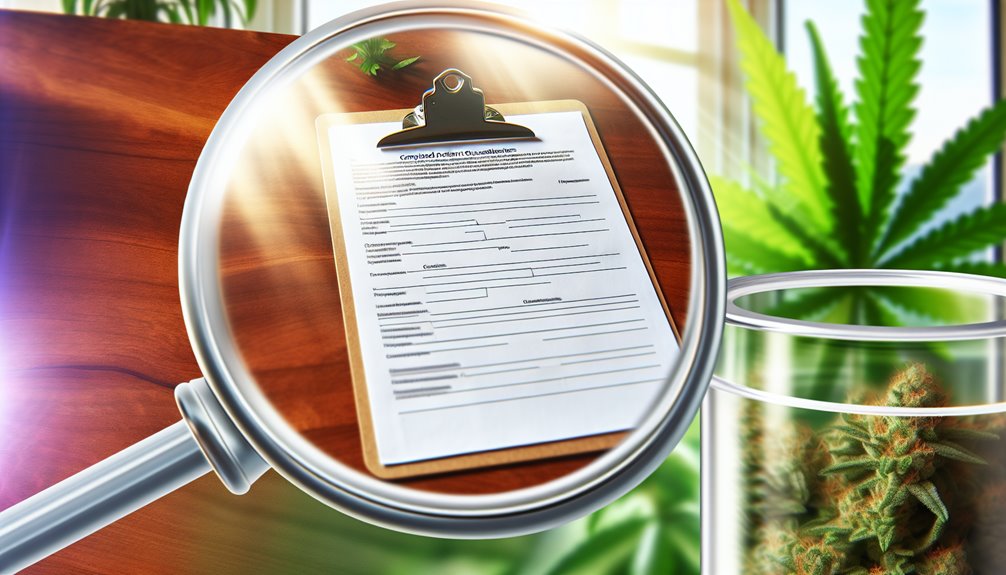So, you've stumbled upon the Maryland Medical Cannabis Patient Survey Report. Interesting, isn't it? Over 13,000 participants shared their experiences, revealing a high satisfaction rate and an increased quality of life. It's touted as a remedy for chronic pain and mental health issues, with users reporting less reliance on opioids. But it's not all rosy – there are side effects, including a rise in driving incidents. This raises important questions about safe cannabis use. Intrigued? There's much more to uncover.
Overview of the Maryland Medical Cannabis Patient Survey

Although you might assume that medical cannabis use patterns would drastically change after the legalization of adult-use cannabis, the Maryland Medical Cannabis Patient Survey (MMCPS) tells a different story. Conducted by Cannabis Public Policy Consulting, the survey utilized a robust methodology, drawing questions from validated, peer-reviewed scientific publications. Over 13,000 patients engaged, reflecting strong commitment to Maryland's medical cannabis program. The data analysis, carried out with IBM SPSS statistical software, revealed interesting patterns. Despite adult-use legalization, most patients remained loyal to the medical program, with minimal changes in use patterns. This high patient engagement and consistent usage underscore the relevance and importance of medical cannabis in Maryland, even amidst broader legalization. Interestingly, the study found a significant discrepancy between patient-reported use and EHR documentation which identified that EHR documentation missed 90% of patient-reported medical use.
Demographics: Who Are the Medical Cannabis Users in Maryland?
Building on the strong commitment to Maryland's medical cannabis program, it's important to understand who these dedicated users are. The demographic trends show that the majority of users are aged 36-45, with a median program participation of 2 years. They're mainly white, but the patient characteristics reveal a diverse user base, ranging from full-time workers to retirees. Over half hold a bachelor's degree or have some college education, with a median annual income of $62,500. Curiously, a significant portion is enrolled in Medicaid. Regionally, users are scattered across the state, with concentrations in Baltimore and Montgomery. A third live with a disability, and chronic pain and anxiety are common conditions. Much like the sentiment towards Infliximab for Crohn's disease, patient opinions on medical cannabis are mixed, with a roughly equal distribution of positive, neutral, and negative sentiments ("mixed sentiments"). Understanding these demographics can help us better serve this community.
Patient's Perception of Medical Cannabis

While examining patient satisfaction and program engagement, a striking trend emerges: patients are largely content with the medical cannabis program in Maryland. Your perceived benefits range from product safety to availability, underlining your high satisfaction. You've indicated a considerable commitment to the program, with less than 2% intending to discontinue. Remarkably, your perception of medical cannabis's efficacy is significant, with severe chronic pain relief and mental health support among the reported advantages. The feedback shows an increasing trend towards using cannabis solely for medical purposes – a reflection of its perceived effectiveness. While you're largely comfortable with your use being known, the survey points to a need for continued safety and dosing education. Ultimately, your engagement and satisfaction underscore the program's success.
Medical Conditions and Cannabis Use
Given the data, it's clear that severe chronic pain is the leading reason you're turning to medical cannabis, with nearly half (46%) of patients reporting this condition. You're also using it for anxiety management, which along with depression, makes up the majority of the "Other" category, representing 33% of responses. Qualifying conditions range from cachexia, anorexia, and wasting syndrome to seizures and PTSD. You've reported effective symptom management, including a reduction in opioid and benzodiazepine use. The median dose varies, indicating a range of needs. The demographic distribution reveals that conditions treated with cannabis vary across regions and ages. This thorough survey therefore gives us a deep understanding of why you're choosing medical cannabis.
Efficacy of Cannabis in Treating Medical Conditions

As you explore the efficacy of cannabis in managing various health conditions, you'll find a considerable body of evidence. Chronic pain is the most prevalent qualifying medical condition, with nearly half of Maryland's medical cannabis patients reporting significant relief.
Cannabinoid mechanisms play an essential role in this, especially in neuropathic pain. Studies show:
- A 72% reduction in chronic pain in the cannabis group
- 46% of patients using cannabis achieved pain reduction greater than 30%
- A significant number of patients use cannabis to reduce opioid use
- Anxiety is the second most common qualifying condition after chronic pain
While patient perceptions of efficacy are high, more research is needed to fully understand its effects.
Reported Side Effects of Medical Cannabis
A third of survey respondents met the criteria for Cannabis Use Disorder (CUD) by 2023, indicating a concerning trend in the medical cannabis patient community. The reported adverse effects included a loss of control over consumption and a significant amount of time devoted to procuring, using, or recovering from cannabis. Impaired driving, a major public health concern, saw a surge, with instances doubling within a year. Cannabis regulation becomes critical here to mitigate these risks. The survey also pointed to an alarming increase in the use of cannabis among pregnant or breastfeeding respondents, who also reported polysubstance use. These findings emphasize the need for patient education and stricter cannabis regulation to safeguard the well-being of both patients and the broader community.
Preferred Methods of Cannabis Consumption

Diving into the preferred methods of cannabis consumption, we find a variety of ways that Maryland's medical cannabis patients choose to use their products. Cannabis trends highlight a shift from smoking, a notably prevalent method, to other consumption preferences.
- Smoking, although decreasing in popularity, is still a common choice, particularly among certain patient groups.
- Edible consumption has seen a rise, offering an alternative to smoking or vaping and providing a different experience.
- Vaping and concentrates represent a considerable portion of consumption, especially among younger patients.
- Other methods, including oral solids and whole flower, are popular, particularly for patients over 40.
These trends demonstrate the diversity within the medical cannabis program, allowing patients to tailor their consumption to their specific needs and preferences.
The Role of Healthcare Professionals in Medical Cannabis Use
When considering the role of healthcare professionals in medical cannabis use, it's important to highlight their multifaceted responsibilities. From qualifications to patient education, their role is pivotal. Physicians and physician assistants must possess active, unrestricted licenses and registrations with the Maryland Medical Cannabis Commission. Their duties extend beyond simply prescribing medical cannabis. They're responsible for evaluating and certifying patients, guiding them through the process, and providing ongoing care. This includes monitoring patients' progress, adjusting treatment plans, and providing guidance on potential side effects. Education plays a key role, with clinical directors training dispensary agents and educating patients on risks, benefits, and side effects. They guarantee compliance with state laws, making healthcare professionals integral to medical cannabis use.
Impact of Medical Cannabis on Quality of Life

Nearly one-third of medical cannabis users in Maryland turn to this treatment for mental health conditions like PTSD, anxiety, depression, and insomnia. It's been observed that this alternative treatment method not only helps manage symptoms but also improves the overall quality of life. Here's what has been found:
- Medical cannabis is perceived as very effective in treating these conditions, contributing to quality improvement.
- Patients reported reduced emotional limitations, fatigue, and pain levels.
- Improvements in physical and social functioning were seen within the first 30–60 days of use.
- Overall health greatly improved, particularly when medical cannabis is used once daily.
These findings highlight the positive impact of medical cannabis on patient outcomes, underscoring its potential in enhancing the overall well-being of those living with chronic diseases and mental health conditions.
Conclusion
You're part of a striking statistic: over 13,000 Maryland residents are using medical cannabis to manage chronic pain and mental health conditions. Most significantly, cannabis use is reportedly reducing opioid dependence, showing the real potential of this treatment. However, let's not overlook the increase in driving incidents reported. It's clear, education on safe cannabis use and proper dosing is paramount. Medical cannabis is improving quality of life, but responsible use is key to its success.
If you're curious to learn more about how medical cannabis can benefit you or someone you care about, I invite you to visit Fells Point Cannabis Docs of Maryland. Our friendly team is here to help answer your questions and guide you through the process. You can also call us at (410) 401-4200. We'd love to hear from you and support your journey toward better health!

